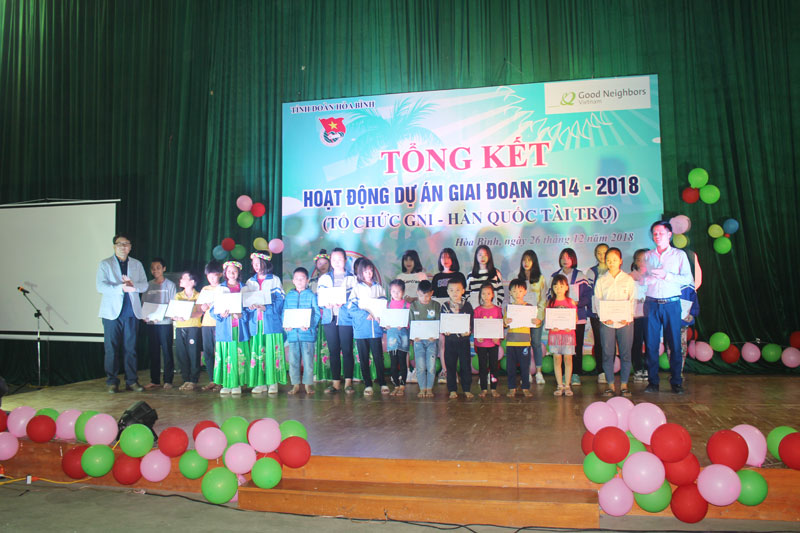
(HBO) – The standing committee of the Ho Chi Minh Communist Youth Union’s Hoa Binh chapter and the Republic of Korea (RoK)’s GNI organisation in Vietnam recently held a programme to review the second phase of the GNI-aided project on building a youth cultural centre in the province (2014-2018).
Attending
the event were leaders from the chapter, the provincial Department of Labour,
Invalids and Social Affairs, and representatives from the RoK organization,
along with over 300 students across Hoa Binh city.
Representatives
from the GNI organisation and leaders from the provincial chapter of the HCM
Communist Youth Union present scholarships to poor children with outstanding
academic performance at the centre.
The second phase of the project was carried
out from January 2014 to December 2018 with the aim of continuously
implementing or replacing some activities in the first phase, as well as
enabling youths from Hoa Binh city to join intensive courses and sports,
extracurricular and social activities, and use library services to develop
intellectual and physical strengths.
The project is carried out in four communes and
wards of Hoa Binh city, namely Thinh Lang, Thai Binh, Thong Nhat, and Dan Chu.
Its main activities are about library and training. During the five-year
implementation of the second phase, the project provided various kinds of books
for the library.
At present, the library has around 10,000 copies with rich contents and
suitable for young readers. In this period, the project trained around 1,338
primary, secondary and high school students with the subjects of English,
Korean, music, art, computing, martial arts, and sports.
The centre now has a multi-purpose house
covering over 500 square metres, four classrooms, one library, one working
house, and a 900-square-metre playground, creating a healthy learning and
playing environment for children.
At the event, representatives of the project
granted 50 scholarships worth 500,000 VND each to needy children at the centre.
The Standing Board of the Hoa Binh provincial Party Committee has agreed in principle on a proposal by the Standing Board of the Party Committee of Hoa Binh city to gather feedback on the city’s 1:2000 zoning plan, which forms part of its broader urban development strategy.
Hoa Binh province has made notable progress in public administration reform and digital government development, with the satisfaction index among citizens and businesses reaching over 84%, according to recent government evaluations.
Thanks to great efforts by local authorities in recent times, the governance and public administration performance of Mai Chau district has been significantly improved.
In the afternoon of June 6, the Party Committee, the People's Council, the People's Committee and the Fatherland Front of Lac Son district solemnly held a meeting to celebrate the 139th anniversary of the district's founding (1886–2025) and the 79th anniversary of the establishment of the district's Party Committee (1946–2025). There was the attendance of Mr. Bui Van Thang, the Vice Chairman of the Provincial People's Council; Mr. Quach Tat Liem, the Vice Chairman of the Provincial People's Committee; Ms. Dang Bich Ngoc, the Deputy Head of the National Assembly Delegation of the province; as well as the former leaders of the province and district through various periods, who are the natives of the district.
Implementing the Politburo’s Resolution No. 57-NQ/TW on breakthroughs in science – technology, innovation, and digital transformation is a golden opportunity for the northern mountainous province of Hoa Binh to renew growth model, improve competitive edge and shorten digital gap.
Resolution 57-NQ/TW, issued by the Politburo on December 22, 2024, identifies sci-tech, innovation, and digital transformation as strategic breakthroughs to build a developed and prosperous nation. In Hoa Binh province, this spirit is not just a slogan, it’s being put into action through concrete initiatives that form a "new development triangle”: digital citizenship, digital economy, and digital administration.



